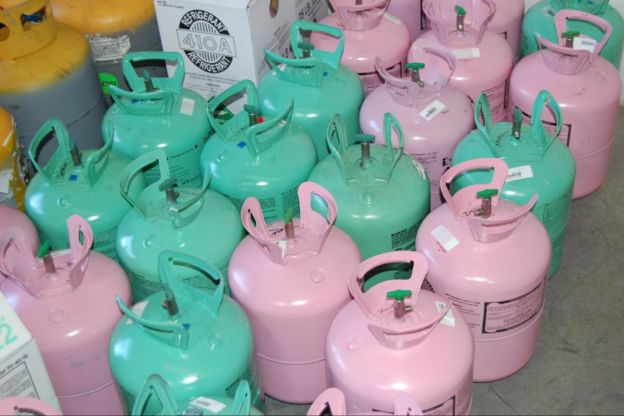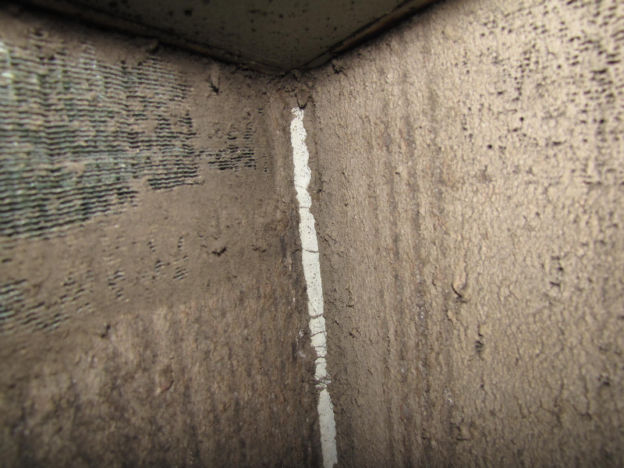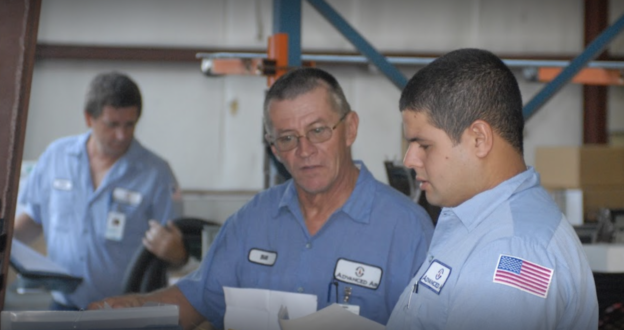Why Does My Air Conditioner Smell Like Chemicals?
November 23, 2021

Does your AC smell like chemicals? Learn why in our blog.
Is your AC pushing a chemical odor out into your home every time it turns on? There’s definitely something going on that an HVAC professional needs to address!
Most likely, you’re dealing with one of these problems:
- A refrigerant leak
- Dirty evaporator coil
- Clogged condensate line
- Leaky ductwork
- Open containers of chemicals near the indoor air handler
Let’s take a look at each of these issues in detail to help you pinpoint a solution based on the type of chemical odor you’re smelling.
Want help figuring out what’s causing the chemical smell? The pros at Advanced Air can help. We offer same-day AC repairs and a 100% satisfaction guarantee.
If Your AC Smells Sweet Like Ether or Chloroform…

If your AC smells like sweet chemicals, you’re most likely dealing with a refrigerant leak.
The problem is likely a refrigerant leak.
Refrigerant is a chemical that your AC uses to absorb heat from the air inside your home. It circulates through your AC in a closed-loop, so you should never be able to smell it unless you have a leak. However, when the refrigerant is exposed, it has a sweet, chloroform-like scent.
If you have a refrigerant leak, you’ll also notice other signs like:
- Your AC struggles to cool your home.
- You have higher energy bills than normal.
- You hear bubbling or hissing noises coming from your AC.
- There is ice on your refrigerant lines or evaporator coil.
The solution: Contact a professional technician to inspect your AC system for a refrigerant leak. Refrigerant can be very harmful to humans, so it’s best to let a professional handle the repairs instead of trying to fix the leak on your own.
If Your AC Smells Musty, Acidic, or Like Ammonia…

A dirty evaporator coil can lead to a musty smell coming from your AC.
You may be dealing with one of these three issues:
1. Dirty evaporator coil
Your evaporator coil is inside your indoor AC unit and absorbs the heat and moisture from the air with refrigerant. But over time, that moisture can mix with dirt on the coils and lead to mold or mildew growth. That can lead to a musty or ammonia-like scent from mycotoxins, a metabolic byproduct of mold and mildew.
The solution: Have a professional inspect your evaporator coil for mold and mildew. A technician can clean it, and they’ll also be able to see if the mold has spread into your ductwork.
2. Clogged condensate line
As we mentioned, your AC cools your home by absorbing heat and humidity from the indoor air. All the humidity's moisture collects in a drain pan and funnels out of your home through the condensate drain line.
Sometimes, the condensate line can get clogged with dirt or debris, causing the moisture to get backed up and sit in the drain pan. Since the pan sits in a warm, dark place, mold and mildew are likely to grow, which could cause a chemical smell.
Other signs you might have a clogged condensate line include:
- Your AC runs for a short time and then shuts off.
- You have water pooling near your indoor unit.
The solution: Contact an AC technician. They can inspect your condensate line and clear it out if it is clogged.
3. Leaky ductwork
Typically, ductwork is in unconditioned areas, like your attic, where mold and mildew can grow. Leaks in your ductwork can allow dust and mold spores to get inside and grow there. As a result, you might detect a musty or ammonia-like smell when your AC kicks on.
The solution: Contact an HVAC technician. They can clean out and seal your ductwork to prevent the mold from growing back.
If Your AC Smells Like Cleaning Supplies, Paint, or Household Chemicals…

Check that you don’t have paint or cleaning chemicals near your AC’s air handler.
You might have open containers of chemicals near the indoor air handler.
In most Florida homes, the indoor air handler (the part of the AC that blows air through your home) is in an interior closet, attic, or basement. And many homeowners also use that space to store other supplies, such as paint or household cleaners. But if those containers are open, your indoor air handler is likely pulling those wafting chemicals into the unit and blowing them straight into your home.
The solution: Locate your indoor air handler and check for open containers sitting near the unit. Close any containers tightly or move them to another area of the house.
Need an AC Technician in Southwest Florida To Get Rid of the Smell? Contact Advanced Air.

Advanced Air’s cooling technicians are thoroughly trained on all AC problems.
Contact Advanced Air today. We’ll find the cause of the smell and get rid of it so you can feel comfortable in your home again. With more 5-star reviews than any other company in Fort Myers and a 100% satisfaction guarantee, you can trust that we’ll provide consistent high-quality and fast AC repair service.
- Posted in:
- Air Conditioning

